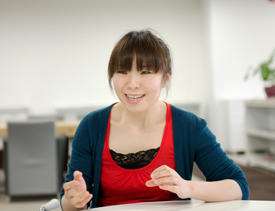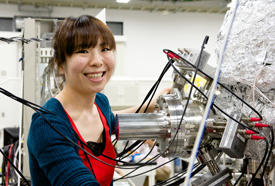

07/29/2013
Established in 2009 with an endowment from Emperor Akihito to encourage and support young scientists, the Japan Society for the Promotion of Science (JSPS) Ikushi Prize has been awarded annually to 16 outstanding early-career researchers in the natural and social sciences since 2010. Akari Takayama, currently a JSPS research fellow in the Materials Physics Group at the Advanced Institute for Materials Research (AIMR), speaks to AIMResearch about her recent award, her research, life at the AIMR and her plans for the future.

AIMResearch: Congratulations on winning the JSPS Ikushi Prize in 2013. How did you learn that you had won the prize?
I found out about it at the end of December when I passed the initial examination meeting of my doctoral thesis. I was talking through my progress and results when my PhD supervisor [Takashi Takahashi, a principal investigator in the Materials Physics Group] gave me the news. The moment I heard I’d won the prize, I was very surprised. Initially, I couldn’t believe it but when it sank in, I was so happy and honored.
We were actually having a belated lab Christmas party at the time. We ate the cake as a sort of unofficial celebration since the lab was sworn to secrecy — the prize results had to be kept under wraps until the official announcement in January. However, I did get to tell my parents.
AIMResearch: The Ikushi Prize is only presented to a small number of top young scientists in Japan every year. What effect has winning this award had on your career so far?
I won the prize for my work as a PhD student, which I carried out under the direction of a supervisor. After receiving the award I feel a responsibility to step up, keep delivering even stronger results and make my mark as a researcher in my own right. However, the greatest immediate change was probably that my research became a lot better known. People now come up to tell me that they have read my papers and take an interest in my work, which of course makes me very happy. But more than the recognition, I value the opportunity this gives me to interact with other researchers, particularly those from adjacent fields. I learn a lot from them and am inspired to look at things from a different angle and imagine different approaches.

AIMResearch: You achieved a tremendous amount during your PhD studies. What do you think has been the key to your success?
I think it helps that I’m a pretty observant person. In my view, it’s really important in scientific research to have an eye for detail and to be able to notice subtle changes that are out of the ordinary. When developing equipment or optimizing an experiment, it is critical to be able to spot what makes one condition different from a previous arrangement and work out how this can be used to improve the experimental outcome. Similarly, when analyzing data, it’s vital to be able to distinguish an unusual and potentially significant result from an artifact.
I’m also somewhat of a perfectionist: all the samples that I make in my research have to be meticulously prepared. If my materials aren’t top quality, I won’t use them. I'm proud of the quality of my samples — I don’t want anyone to say my samples are a bit substandard.
AIMResearch: Your PhD thesis discussed the effects of spin polarization in materials, which is extremely important for technologies such as 'spintronics'. What is spintronics, and how does your work contribute to the field?
Spintronics involves trying to control and manipulate the direction of the magnetic moment, called 'spin', that is one of the fundamental properties of electrons. One application for this technology is to use it to store electronic information as the basis for new types of computer memory, which would be many times smaller and more energy efficient than current devices. But in order to control these spins, we first have to be able to measure properties such as their size and the direction in which they are pointing. My work involves designing equipment and methods for measuring these properties very accurately, which can be quite challenging.
Thanks to the JSPS fellowship, I will be able to extend my PhD work to other materials systems and to study their spin-polarization phenomena. My research has discovered anomalous behaviors of spin, and the results suggest a new possibility of spintronics. To check the universality of this discovery, I am eager to investigate systems with different elements to the one I have been studying, but which theory suggests should display the same kinds of phenomena.
AIMResearch: What are the best things about working at the AIMR, and what attracted you to carry out your doctoral research here?
There are many reasons to study at the AIMR. You get to meet and work with a great number of extremely talented researchers from different, but related, fields and are therefore able to take advantage of their insight and ideas. For example, I often interact with colleagues from the recently incorporated Mathematics Unit at events such as the weekly Tea Time, and we have had many useful and interesting discussions. My interest in mathematics and my level of understanding has definitely improved as a result, and I am sure this will have a positive impact on my work in the future. Plus, AIMR researchers come from all over the world, which is enormously stimulating.
The facilities and the research support provided by the AIMR are truly excellent. Obviously, we have the necessary equipment within our lab to obtain high-quality data for experiments in our field, but with the kind of advanced, cross-disciplinary research that my group is performing, we often need to look at our systems from different experimental perspectives. Fortunately, at the AIMR I have access to all the other resources — both facilities and research collaborators — that I need, under one roof.
AIMResearch: You have already achieved a great deal in your career. What are your plans for the future?
I definitely want to stay in research, but I don’t particularly feel the need to become a famous professor. The part of my research that I like best is designing and making new experimental equipment, then using it to explore new materials systems. The moment when I first obtain new data is really exciting. I’d like to keep working in an environment where I can pursue research and experience the thrill of discovery. I also want to try my hand at other experimental techniques. Up to now, I’ve specialized in photoemission spectroscopy, but I’d really like to learn new methods in order to evaluate the quality of samples more comprehensively. Wherever I am and whatever methods I use, I see myself always enjoying life as a researcher, though I think that it is hard to learn new techniques. For this reason, even small and incremental improvements please me when I am making samples or setting up machines.